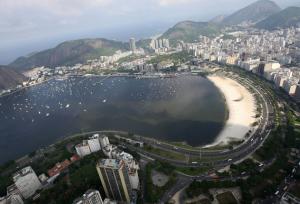GOD may not be Brazilian, as many of the inhabitants of Rio de Janeiro proudly boast, but The Almighty seems to be swinging His or Her not inconsiderable influence towards the Cidade Maravilhosa, the Marvellous City on the South Atlantic ocean, as it pitches strongly for the chance of staging the 2016 Olympic Games. Its three rivals, Tokyo, Madrid and Chicago, seem to be fading as they turn into the home straight towards O Day in five days’ time. On 2 October the victorious city should be announced in Copenhagen, watched by a billion television vie
Botafogo beach in Rio de Janeiro. The IOC committee will pay a four-day visit to assess the city’s 2016 Olympic bid

viewed from across the world.
On Tuesday, in Brasilia, senators moved to approve the legislation needed to guarantee everything required for a successful bid – from funding to regulations to stop hoteliers overcharging for rooms. On Wednesday, The New York Times appeared to give up on the Windy City on the chilly shores of Lake Superior, hinting that the Brazilian president, Luis Inácio da Silva, whom everyone calls Lula (“The Squid”), had the easiest job in the world to land the prize. Lula, the former metalworker and trade union leader who years ago lost a finger in a hydraulic press, himself confessed he had the advantage. He will be accompanied to Copenhagen by his wife, Marisa, while Michelle Obama will be there without her husband. “So it’ll be two to one,” he pointed out with quiet delight.
Next month’s vote could be a milestone on Brazil’s journey away from being the eternal country of the future – and the one for which the future never comes – towards becoming an undisputed world power, with a permanent presence on the UN Security Council and the cash to feed, educate and care for its population of nearly 200 million.
Related articles
- Chicago and Rio in Olympic star wars
- Search the news archive for more stories
Lula, who as a child supplemented his mother’s budget by selling peanuts around the docks of Santos, is revelling is his new eminence, his freedom to blame the current world financial crisis on “blue-eyed bankers” and to command respect. Bankers’ panic and media alarm in the City of London and Wall Street in the months before his first massive electoral victory of 2002 are things of the past. Today Brazil is one of the so-called “BRICs”, along with Russia, India and China, and admired by bankers and economists. And not only does President Obama call him the world’s most popular leader but, after a period when government corruption looked as though it might topple him, Lula’s approval rating with voters is now around 80 per cent.
No longer a financial basket case struggling with hyperinflation, Brazil is looking forward to the tsunami of riches that will engulf it when Petrobras, the highly successful publicly controlled oil company, gets full production from the enormous new oilfields deep under Brazilian seas. Lula is making plans to use the new money to correct the abuses that stemmed from the Western-supported military coup of 1964, and the subsequent years of savage repression and torture, which ground down his own living standards and those of millions of other poor Brazilians. Brazil is also a massive food exporter – comforting when famine stalks many other places.
The past few weeks have demonstrated that Lula is drawing on tomorrow’s wealth as the lever for international influence today. The first head of state to talk in the debate in the UN General Assembly on Wednesday, he got in before Colonel Gaddafi’s 90-minute philippic which inconvenienced everyone else. He took the opportunity to lambast the ideas of the Western powers during the financial crisis. “What fell to the ground was the social, political and economic concept accepted as unquestionable,” he said in a sharp dig at politicians and bankers opposed to government regulation of the markets. Lula’s efforts have helped to crush the Group of Eight rich countries, replacing it with the Group of 20, which includes developing countries and which met in Pittsburgh on Thursday to start reforming the world’s finances.
At the General Assembly he also demanded an immediate end to the coup d’état in Honduras, where the Brazilian embassy is sheltering Manuel Zelaya, the legitimate president overthrown on 28 June by an impostor with military support. Lula is calling for Security Council action against the increasingly barbaric new regime threatening it with the full force of international law, particularly if it continues to deprive the Brazilian diplomats and their guests of power, water and food. Brazilian action, closely backed by the Venezuelan government, has wrong-footed Washington, exposing a clear gulf on the Honduran mess between Obama, who wants decisive action to restore Zelaya, and a shilly-shallying Hillary Clinton, whose right-wing advisers have other ideas.
Lula is, too, a leader in the new political bloc the Union of South American Nations. Unasur is resisting the militarisation of South America that many think will follow if Colombia, a close ally of the US, allows the Pentagon to establish seven new bases on its land; these would allow the US to dispatch warplanes to any part of the continent except southern Patagonia. As a precaution, Lula is buying arms in France and Russia.
In his efforts to accelerate the drive for Latin American unity, Lula has taken political risks at home, daring to take on the powerful electricity companies. In order to cement relations with his poor neighbor Paraguay, he has promised a new deal on the gigantic hydroelectric Itaipú dam whose power is supposed to be shared by both countries but which in fact goes overwhelmingly to Brazil.
However, if Rio wins on Friday, Lula will settle back to the task of giving the city’s dispossessed hope – and ensuring that South America’s first Olympics pass off peacefully.